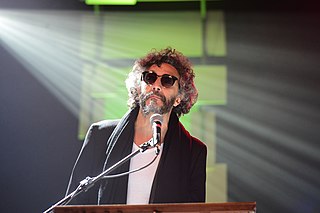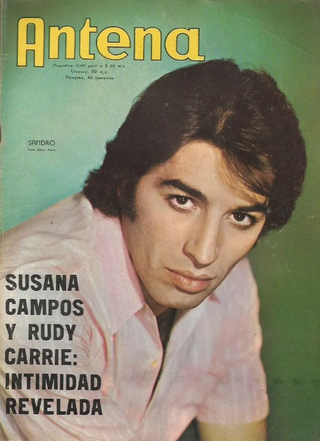
Gustavo Adrián Cerati was an Argentine musician, singer-songwriter and record producer, who gained international recognition for being the leader, vocalist, composer and guitarist of the rock band Soda Stereo. He is widely considered by critics, specialized press, and musicians as one of the most important and influential artists of Latin rock. Billboard magazine ranked Cerati as the 33rd best rock singer of all time.

Almendra was one of the most important rock groups from Buenos Aires, Argentina in the late 1960s.
Argentine rock is rock music composed or performed by Argentine bands or artists mostly in Spanish.

Rodolfo Páez, popularly known as Fito Páez, is an Argentine popular rock and roll musician and filmmaker.

Miranda! is an Argentine electropop band formed in Buenos Aires in 2001. Original band members include Alejandro Sergi, Juliana Gattas, Lolo Fuentes (guitar), Bruno de Vincenti (programming), and Nicolás Grimaldi (bass). It is currently a duo between Sergi and Gattas.
Los Violadores are a rock band from Argentina, pioneers of the punk rock genre in Latin America.
Fabián Andrés González Amado, known by his stage name Tweety González, is an Argentine musician and record producer. González is mostly known for playing the keyboard for Argentine rock band Soda Stereo and Argentine musician Fito Páez. Tweety is also a music producer and has worked with artists Shakira, Gustavo Cerati, Illya Kuryaki and the Valderramas, Luis Alberto Spinetta, Superlitio, Famasloop and several others. Gustavo Cerati's 2006 Ahí vamos in which Tweety played keyboards won the Latin Grammy for Best Rock Solo Vocal Album.

Roque Funes was the most prolific Argentine cinematographer in the history of the Cinema of Argentina whose career spanned over 40 years of cinema.

Américo Hoss was a prolific Hungarian-Argentine cinematographer.

Guillermo Battaglia was a prolific Argentine film actor of the classic era of Argentine cinema.

Roberto Sánchez-Ocampo, better known by his stage names Sandro or Sandro de América, was an Argentine singer and actor. He is considered a pioneer of Argentine rock for being one of the first rock artists to sing in Spanish in Latin America. He edited 52 official records and sold eight million copies although other sources state that he sold over 10 million. Some of his most successful songs are "Dame fuego", "Rosa, Rosa", "Quiero llenarme de ti", "Penumbras", "Porque yo te amo", "Así", "Mi amigo el Puma", "Tengo", "Trigal", and "Una muchacha y una guitarra". The single "Rosa, Rosa" sold two million copies, being his most recognizable and famous song. Another of his hits, "Tengo" was given 15th place among the 100 best Argentine rock songs by both MTV and Rolling Stone magazine. In Latin America he was often compared to Elvis Presley at the height of his popularity.

Juan Carlos Altavista was an Argentine actor and comedian.

Luis (Leopoldo) Franco was an Argentine autodidact, a self-made intellectual, essayist, and poet.
Alejandro Rozitchner is an Argentine writer. "Artist of the ideas" or "intellectual nutritionist" are some of the names with which he describes his work. He is characterized by his affirmative thinking, his appreciation for enthusiasm, and for his open, casual, and provocative style.

Félix Francisco Nebbia Corbacho, better known as Litto Nebbia is an Argentine singer-songwriter, musician and producer, prominent in the development of the early Argentine rock scene.

Tango Feroz: la leyenda de Tanguito is a 1993 Argentine drama musical film directed by Marcelo Piñeyro, his debut film. It is loosely based in the life of Tanguito, one of the first artists of Argentine rock. Fernan Mirás and Cecilia Dopazo, unknown to most spectators by that point, had the lead roles and became famous after the film's release. It was the most successful Argentinian movie of all time.
Antonio Ber Ciani was an Argentine actor and film director. He is known for films such as Don Bildigerno de Pago Milagro.

Horacio Rodríguez Larreta is an Argentine economist, politician and the former Chief of Government of the City of Buenos Aires. Larreta was re-elected in 2019 with almost 56% of the votes, becoming the first candidate to win a mayoral election in the first round since the adoption of Buenos Aires's autonomous constitution. He won in every comuna, except Comuna 4 and Comuna 8.

The Regional Express Network was a planned commuter network system in Buenos Aires, which consisted in an underground connection among the 3 mainline railway stations of the city: Retiro, Constitucion and Once, in the north, south and west respectively.
María José Cantilo was an Argentine singer and songwriter.














